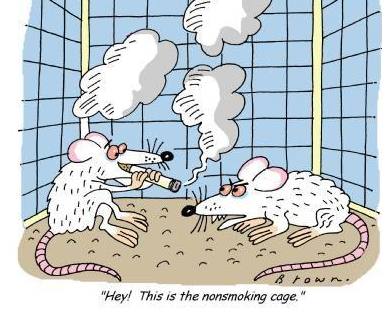It’s one of the truisms of human life that teenagers often do silly, stupid and/or dangerous things. We certainly don’t need science to tell us that. One reason this seems to be the case is that, on average, teens have trouble optimally weighing risk vs. reward. I’m not excluding myself from this characterization. In fact, I sometimes marvel that I survived my teen years intact, if at all.
One stupid thing I and many of my friends did as teenagers was to try smoking.
There are no rational arguments in favor of smoking. Yet, according to one study, most adult smokers start before age 19 and 70% of all adolescents report trying a cigarette at least once. Messages directed to adolescents and teens against smoking often fall on deaf ears. In addition to subpar decision making skills, many teens hold the advice of their elders in low regard and are apt to pick up a cigarette as an act of defiance or as a show of their burgeoning adulthood. Hollywood films certainly contribute to the smoking mythology through their noble portrayals of troubled, rebellious or misunderstood teens reaching for smokes when the chips are down.
Although the health risks associated with smoking are widely known, a recent Nature Neuroscience study has provided even more reasons for teens to avoid smoking. Researchers from the Netherlands found that in adolescent rats, exposure to smoking led to increased and long lasting impulsiveness and impaired measures of attention in adulthood. In contrast, adult animals exposed to similar levels of nicotine did not show these long term effects. So, the impulsiveness that might lead a teen to try smoking could be increased by the very product of that impulsiveness, creating a vicious feedback cycle. Nasty business.

What’s the molecular mechanism? A proteomic analysis of 297 different mPFC proteins in adolescent rats who had exposure to smoking showed that levels of mGLuR2 was downregulated. mGluR2 is a metabotropic glutamatergic receptor that sits on the presynaptic side of synapses in the mPFC, a brain region important for cognitive control and attention. Adolescent nicotine exposure resulted in decreased mGLuR2 signaling and reduced plasticity in the mPFC. This was shown to be directly related to attentional deficits by a rescue experiment in which a glutamate agonist was injected into the mPFC in vivo. The agonist restored attentional performance to normal levels but didn’t affect impulsiveness.
In sum, the adolescent brain is more susceptible to the consequences of smoking via alteration of synaptic mGluR2 protein levels. It’s known that nicotine exerts its initial effects on the brain through nicotinic acetylcholine receptor activation and this study suggests that adolescents are uniquely vulnerable to increased activation of these receptors.
The researchers acknowledge that the sequence of molecular events is unknown, but speculate that “…mGluR2 levels following nicotine exposure at the end of adolescence compensate for nicotine’s actions and inhibit neurotransmitter release.” One caveat to keep in mind is that it’s unknown the extent to which this effect would be replicated in humans. Another important point is that in this experiment, nicotine was dissolved in solution and administered subcutaneously. Cigarettes contain many other carcinogens and toxins to which adolescents could be particularly vulnerable, so the long-term cognitive effects of cigarette smoking could extend far beyond those uncovered in this study, which looked just at nicotine.
The takeaway message is definitely clear: Parents, do everything you can to keep your kids from smoking!*
*I’m an advocate for making the sale of tobacco and tobacco related products illegal. Tobacco offers no clear benefits to society, with the exception of a few thousand jobs and the enrichment of a couple handfuls of business executives, while incurring great economic costs to the nation as a whole. Although nicotine has shown some cognitive benefits to individuals in certain disease states, all in all its mostly detrimental. (I’m a member of that most annoyingly vociferous group of anti-smoking activists: ex-smokers. Maybe we’re so adamant because we know how hard it is to quit!) That long-term cognitive deficits are now being shown to accrue in cigarette smoking teens is hopefully another nail in the coffin of the tobacco industry and smoking culture in general, which will perhaps be looked back upon as a sign of the special ignorance of our times.
References
Counotte DS, Goriounova NA, Li KW, Loos M, van der Schors RC, Schetters D, Schoffelmeer AN, Smit AB, Mansvelder HD, Pattij T, & Spijker S (2011). Lasting synaptic changes underlie attention deficits caused by nicotine exposure during adolescence. Nature neuroscience, 14 (4), 417-9 PMID: 21336271